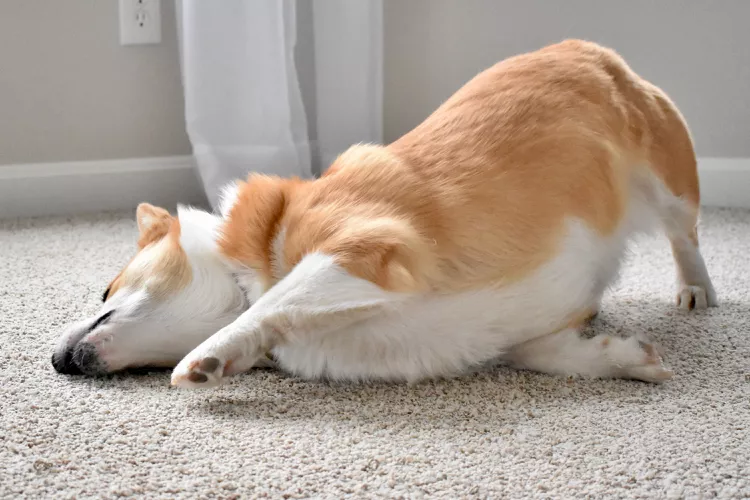Dogs are undoubtedly fascinating creatures with a myriad of intriguing behaviors. One such behavior that often leaves pet owners puzzled is when dogs inexplicably rub themselves against walls. Whether it’s a gentle lean or an enthusiastic full-body rub, this peculiar action raises questions about its underlying motives and significance. In this article, we will delve into the reasons behind Why Do Dogs Rub Against Walls, shedding light on the possible explanations and offering insights into their fascinating world.
 The Curious Behavior: Why Do Dogs Rub Against Walls
The Curious Behavior: Why Do Dogs Rub Against Walls
Here are some of the reasons of Why Do Dogs Rub Against Walls:
1. Instinctual Marking and Territorial Behavior
One of the primary reasons why dogs rub against walls is rooted in their instinctual marking and territorial behavior. Dogs have a keen sense of smell, and they use scent marking as a way to communicate with other animals. By rubbing against walls, dogs leave behind their unique scent, effectively marking the territory as their own. This behavior is more commonly observed in unneutered male dogs, as they have a stronger drive to assert dominance and establish their presence.
2. Relieving Itching and Discomfort
Another possible explanation for Why Do Dogs Rub Against Walls is to alleviate itching or discomfort. Dogs can experience various skin irritations, allergies, or even insect bites that can lead to itching. The friction created by rubbing against walls can provide temporary relief by scratching the affected area. Additionally, the rubbing motion may help stimulate blood circulation and provide a form of self-massage, offering further relief to any muscle tension or discomfort the dog may be experiencing.
3. Seeking Comfort and Social Interaction
Dogs are social animals that thrive on physical contact and interaction. When dogs rub against walls, it may be an attempt to seek comfort and mimic the feeling of being close to another living being. This behavior can be more prominent in dogs that experience separation anxiety or those in need of additional socialization. By rubbing against walls, dogs may be trying to fulfill their need for physical contact when other companions are not readily available.
4. Environmental Stimulation and Sensory Exploration
Rubbing against walls can also be a way for dogs to engage in environmental stimulation and sensory exploration. Walls often have different textures, temperatures, and scents, which can provide dogs with a variety of sensory experiences. By rubbing against walls, dogs may be seeking tactile and olfactory stimulation, satisfying their curious nature and exploring their surroundings in a unique way.
Practical Recommendations: Addressing Dogs’ Wall-Rubbing Behavior
Here are some of the recommendations of Why Do Dogs Rub Against Walls:
1. Consult with a Veterinarian
If your dog frequently engages in wall-rubbing behavior, it is crucial to first rule out any underlying medical issues or discomfort. Schedule a visit with a veterinarian to assess your dog’s overall health and determine if there are any skin conditions, allergies, or other ailments that may be causing the behavior. Treating any underlying medical issues can help alleviate the need for your dog to seek relief through wall rubbing.
2. Provide Environmental Enrichment
To redirect your dog’s attention and provide alternative outlets for their energy, it is essential to enrich their environment. Offer a variety of toys, puzzles, and interactive games that stimulate their mind and keep them engaged. Consider puzzle feeders or treat-dispensing toys to provide mental stimulation during mealtime. Additionally, rotate toys regularly to keep them novel and exciting for your dog.
3. Increase Physical Exercise
Regular physical exercise is crucial for a dog’s overall well-being and can help reduce restlessness or excess energy that may contribute to wall-rubbing behavior. Ensure your dog receives daily exercise through walks, playtime, or other physical activities suitable for their breed and age. Engaging your dog in regular exercise not only helps tire them out but also provides mental stimulation and promotes a healthy lifestyle.
4. Address Separation Anxiety
If your dog’s wall-rubbing behavior is associated with separation anxiety, it is essential to address this underlying issue. Gradual desensitization and counter-conditioning techniques can help alleviate separation anxiety in dogs. Start by leaving your dog alone for short periods and gradually increase the duration over time. Provide them with a safe and comfortable space, such as a crate or designated area, where they feel secure when left alone.
5. Engage in Positive Reinforcement Training
Using positive reinforcement techniques, such as rewards and praise, can help redirect your dog’s behavior and reinforce desirable actions. When your dog shows alternative behaviors, such as using a scratching post or engaging in interactive play, reward them with treats or verbal praise. Consistency and patience are key when training your dog, so be sure to reinforce positive behaviors consistently.
6. Seek Professional Guidance
If you are struggling to address your dog’s wall-rubbing behavior or if the behavior persists despite your efforts, it may be beneficial to consult with a professional dog behaviorist or trainer. They can assess the specific needs of your dog, provide tailored guidance, and develop a behavior modification plan to address the underlying causes of the behavior effectively.
Remember, every dog is unique, and it may take time and patience to modify their behavior. By implementing these practical recommendations and understanding the Why Do Dogs Rub Against Walls behavior, you can help your dog find healthier and more appropriate ways to fulfill their needs and ensure their overall well-being.

Why Do Dogs Rub Against Walls
Why Do Dogs Rub Against Walls – Conclusions
The behavior of dogs rubbing against walls can be attributed to various factors. From instinctual marking and territorial behavior to relieving itching or seeking comfort and social interaction, Why Do Dogs Rub Against Walls for a multitude of reasons. Understanding the motives behind this behavior can help us better care for our canine companions and address their needs effectively.
If your dog frequently rubs against walls, it is essential to consider any underlying medical issues or discomfort they may be experiencing. Consult with a veterinarian to rule out any skin conditions or allergies that require treatment. Additionally, providing ample opportunities for social interaction, physical contact, and environmental enrichment can help alleviate the need for dogs to seek comfort through wall rubbing.
Remember, every dog is unique, and their behavior may vary. If you have concerns about your dog’s behavior or need further assistance, it is always recommended to seek guidance from a professional dog behaviorist or trainer. By understanding and addressing the motivations behind dogs rubbing against walls, we can ensure the well-being and happiness of our beloved furry friends.









 The Curious Behavior: Why Do Dogs Rub Against Walls
The Curious Behavior: Why Do Dogs Rub Against Walls












